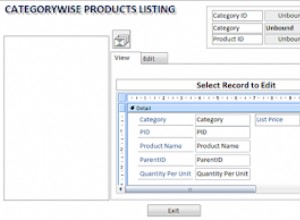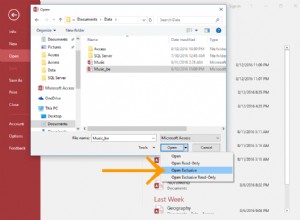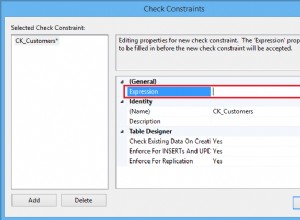Supponendo che la tua tabella si chiami temp (probabilmente no - cambialo con il nome corretto del tuo tavolo)
Ho usato una sottoquery per trovare tutte le parole nella tua tabella:
select distinct regexp_substr(t.name, '[^ ]+',1,level) word , t.name, t.id
from temp t
connect by level <= regexp_count(t.name, ' ') + 1
questa query divide tutte le parole da tutti i record. L'ho alias words .
Poi l'ho unito alla tua tabella (nella query si chiama temp) e ho contato il numero di occorrenze in ogni record.
select words.word, count(regexp_count(tt.name, words.word))
from(
select distinct regexp_substr(t.name, '[^ ]+',1,level) word , t.name, t.id
from temp t
connect by level <= regexp_count(t.name, ' ') + 1) words, temp tt
where words.id= tt.id
group by words.word
Puoi anche aggiungere:
having count(regexp_count(tt.name, words.word)) > 1
aggiornamento :per prestazioni migliori possiamo sostituire la subquery interna con i risultati di una funzione pipeline:
in primo luogo, creare un tipo di schema e una sua tabella:
create or replace type t is object(word varchar2(100), pk number);
/
create or replace type t_tab as table of t;
/
quindi creare la funzione:
create or replace function split_string(del in varchar2) return t_tab
pipelined is
word varchar2(4000);
str_t varchar2(4000) ;
v_del_i number;
iid number;
cursor c is
select * from temp; -- change to your table
begin
for r in c loop
str_t := r.name;
iid := r.id;
while str_t is not null loop
v_del_i := instr(str_t, del, 1, 1);
if v_del_i = 0 then
word := str_t;
str_t := '';
else
word := substr(str_t, 1, v_del_i - 1);
str_t := substr(str_t, v_del_i + 1);
end if;
pipe row(t(word, iid));
end loop;
end loop;
return;
end split_string;
ora la query dovrebbe essere simile a:
select words.word, count(regexp_count(tt.name, words.word))
from(
select word, pk as id from table(split_string(' '))) words, temp tt
where words.id= tt.id
group by words.word




